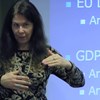automatik
The future of automation
Depending on your perspective, technological development has been saving us from drudgery, or destroying our livelihoods, for centuries. From the very first domestication of animals we’ve been finding

Automated judicial decisions and privacy with Cecilia Magnusson Sjöberg
Presentation from the workshop "AI and autonomous decision making" at the Institute for Futures Studies in Stockholm, October 2017.

Evaluated by a robot. An experimental-ethnographic study of the automation of the recruitment process in a Swedish municipality
In a unique project the researchers will study the differences between an AI-based interview robot's and human recruiters' evaluations of jobseekers in a Swedish municipality during a year.
Chapter 14 Collaborative Future-Making: Bridging the Everyday and the Global Political Economy of Automated Health
Fors, Vaike, Berg, Martin and Brodersen, Meike. The De Gruyter Handbook of Automated Futures: Imaginaries, Interactions and Impact, Berlin, Boston: De Gruyter, 2024. Abstract Health services and medical

Automating authority: Accuracy, assessment, acceptance and legitimacy of AI decision-making in the public sector
The aim of this project is to build an interdisciplinary research environment that analyzes the proliferation of AI in the public sector, its impact on the decisions being made and its effects for democracy.
Do we need dual-process theory to understand implicit bias? A study of the nature of implicit bias against Muslims
in: Poetics AbstractPsychological dual-process theory has become increasingly popular among sociologists. The dual-process framework accounts for two types of thinking; a fast, associative, automatic o

Machine learning, norms and data collection with Pontus Strimling
Presentation from the workshop "AI and automated decision making" at the Institute for Futures Studies in Stockholm, October 2017.
Åsa Burman and Katharina Berndt Rasmussen: Implicit bias, discrimination, and moral responsibility
Åsa Burman, Director of Studies in practical philosophy at Stockholm University and affilited researcher at the Institute for Futures Studies & Katharina Berndt Rasmussen, Researcher at the Institu
The fast and furtive spread of AI by infusion into technologies that we already in use – a critical assessment
In Hanemaayer, A. (editor) Artificial Intelligence and Its Discontents. Palgrave. Abstract AI has often reached individuals covertly, rather than by their own choosing. Standard automatic version update
Completed: Individual and collective responsibility for discrimination from implicit bias
The project aims to evaluate the ethical consequences, on an individual and collective level, of implicit bias that causes ethnic discrimination.








